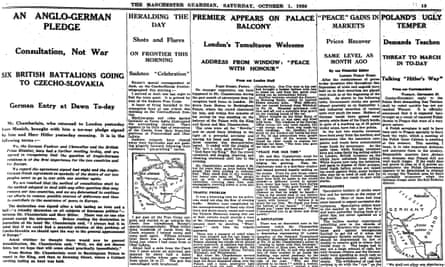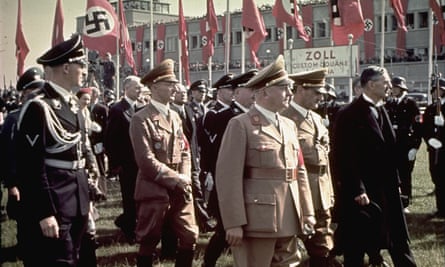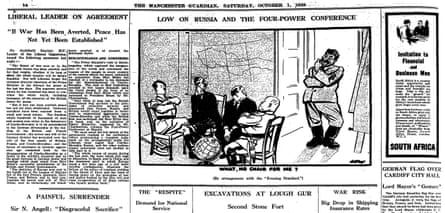What Happened at the Munich Conference That Allowed Hitler to Continue His Aggressive Actions
On 30 September 1938, Germany, Britain, France and Italy reached a settlement that permitted German annexation of the Sudetenland in western Czechoslovakia. The area contained about three million people of German origin and in May 1938 it became known that Hitler and his generals planned to occupy the country.
The Czechoslovak government hoped that Britain and France would come to its assistance in the event of an invasion, but British Prime Minister Chamberlain was intent on averting war. Between 15 and 30 September he made three trips to Germany to see Hitler. The final one in Munich resulted in large swathes of Czechoslovakia coming under Nazi rule. Britain and France would not support any Czech resistance.
Returning from Munich, Chamberlain told an excited crowd at Heston Airport, 'It is peace for our time', and waved the agreement he had signed with Hitler. This was the climax of the appeasement policy. Six months later, Hitler reneged on his promises and ordered his armies to march into Prague. Within a year, Britain and France were at war with Germany.
The Manchester Guardian covered all angles of the story – from the detail of the agreement, Chamberlain appearing on Buckingham Palace balcony to unease amongst other nations. An editorial thought the piece of paper he waved on his return to the UK almost worthless.

Hitler's new powers: Czechoslovakia at his mercy
By our diplomatic correspondent
1 October 1938
London, Friday
The Munich agreement gives Hitler everything he wants (to begin with) except in so far as it does not perhaps quite enable him to get it as quickly as he would have done under the untrimmed ultimatum of Godesberg. He will begin the invasion of Czechoslovakia tomorrow exactly as he threatened to do in his speech on September 12. He is free to occupy all the regions where the Sudeten Germans are in a majority, and to do so by rapid stages.
All the misery and outrage that followed the German occupation of Vienna are now certain to follow the German occupation of the Sudetenland. Prague has, even now, begun to fill with refugees – Sudeten German Socialists, Jews, not to speak of Czechs, – which is natural enough, seeing that for months the German newspapers, wireless, and Hitler himself have referred to the Czechs in terms that have been one prolonged incitement to acts of violence and oppression.
By October 10 Hitler will have annexed a vast area with great natural and industrial wealth, and is not even to pay compensation for Czech property, whether private or Government. He will be master of Czechoslovakia's main defences, and there is nothing to stop him from making himself master of all Czechoslovakia in course of time.
The Plebiscite
To give him control over the regions where the Sudeten Germans are in a minority the device of the plebiscite (which was rejected under the Anglo-French proposals) has been used. Did Mr. Chamberlain and M. Daladier ask Hitler what the plebiscite was for and how, without intimidation, he could hope for a Sudeten German majority, in regions where they are known to be a minority? Elections and plebiscites held under Hitler offer many examples of the way in which they can be manipulated.

The areas selected for the plebiscite are not quite the same, as in the Godesberg ultimatum. For example, the industrial town and railway junction of Brno is not included. But the Germans will be so close to this town that it will be at their mercy. Besides, it has a small German minority (about 12 per cent of the total population), which, under pressure from Hitler, will be its real administrators. Any village or township with German majority (and there are many such scattered throughout Czechoslovakia and right into Carpathian Ruthenia) in regions where the Czechs are the vast majority can, through the device of the plebiscite, be made to become a German stronghold, dominating the surrounding country like the castle of a medieval robber baron. With the help of the plebiscite Hitler can get control of factories, railways and strategic points. In a short time he can make himself master of Czechoslovakia without war and without any serious opposition from the Western Powers.
The question of the plebiscite was the only serious hitch at Munich. The "Big Four" were unable to agree as to the areas where the plebiscite is to be held. The question was referred to a commission made up of the British, French, and Italian Ambassadors in Berlin, of a Czech official and of Herr von Weizsaecker, of the German Foreign Office. German demands and the demand will certainly be satisfied – that all persons who were residents in the area designated for the plebiscite in October, 1918, shall be entitled to vote. In this way large numbers of former Austrian officials and residents can be drafted into these areas and so help to convert minorities into majorities.
The "guarantees"
Germany and Italy will only "guarantee" Czechoslovak neutrality when the claims of Hungary and Poland have been satisfied – that is to say, their guarantee will only be given, if at all, when the partition of Czechoslovakia has made further progress. It is to be feared that by that time every guarantee, whether German and Italian or French and British, will have lost whatever meaning it might once have been made to have.
The economic consequences of the Munich agreement are bound to be very hard for Czechoslovakia. The loss of industries, railheads, junctions and so on, cannot fail to cause heavy loss of trade and unemployment. Nor can there be any doubt that Czechoslovakia will become for Germany an object of quasi-colonial exploitation.
Two days later, all the editorials were devoted to Munich, including the following about censorship.
Editorial: Kept in the dark
3 October 1938
One aspect of the vast disturbance of the last fortnight must strike anybody who reflects on its history. In the three most powerful States of Central and Eastern Europe the peoples were not allowed to know what was being said and done outside. In Russia there seems to have been very little news. In Germany and Italy the news was deliberately falsified when it was not suppressed. The German people were not allowed to know of President Roosevelt's message. The Italian people were led to believe that Chamberlain was in agreement with Hitler and only anxious to put pressure on Benes. Of one of his speeches they were given a false version.
When you look at the population of Europe you find that almost one half of it was thus left in ignorance or deceived. Of the four Powers represented at Munich, France and Great Britain have between them a population of about ninety millions and Germany and Italy a population of one hundred and fifteen. The people of France and Great Britain knew everything and the people of Germany and Italy very little.
It used to be said that the first casualty in war is truth; but there are countries in which truth is killed long before war begins. During the war between Russia and Japan we were told as a dramatic indication of the dense ignorance of the Russian peasant that there were villages in which nobody knew that a war was going on; that was cited as an illustration of the primitive state of Russian civilisation. To-day the most alarming fact is the ignorance of the best educated peoples, an ignorance that is the result of deliberate policy on the part of their rulers.
It is curious to reflect that this sudden return to the arts of concealment and suppression comes at a time when the growth of democratic ideas and the triumphs of invention seemed to be spreading general enlightenment. President Wilson, who coined phrases that have come to such unhappy results, spoke at the Peace Conference of open covenants openly arrived at, thinking that justice and peace were assured of success if men lived in the full light of day. When Bridges wrote his Testament of Beauty he thought that wireless had made war much more unlikely. He argued that "the drowned voice of truth, mantled in light's velocity," would spread over land and sea,
Whereby war, fallen from savagery to fratricide,
From a trumpeting, vain glory to a crying shame,
Stalketh now with blasting curse branded on its brow.
No doubt the wireless has had a great influence in the last fortnight, for the contrast between German truculence and the moderation of the leaders of other countries, including in particular Czechoslovakia, made a great impression here, in the United States, and in all neutral countries. But so far as the dictator countries are concerned much less was known of the outside world than would have been known half a century ago. For the machinery of suppression is now perfected, and when it is used to its full power little light can break through. Thus great wars may be started in the dark by peoples who know nothing beyond what their rulers let them know. In this way the common life of the world is affected by the state of its several peoples, and the loss of freedom in any one of them becomes a danger to peace.
The Soviet Union was not included in the Munich discussion, a point highlighted in a cartoon by Low.

Source: https://www.theguardian.com/world/from-the-archive-blog/2018/sep/21/munich-chamberlain-hitler-appeasement-1938
0 Response to "What Happened at the Munich Conference That Allowed Hitler to Continue His Aggressive Actions"
Post a Comment